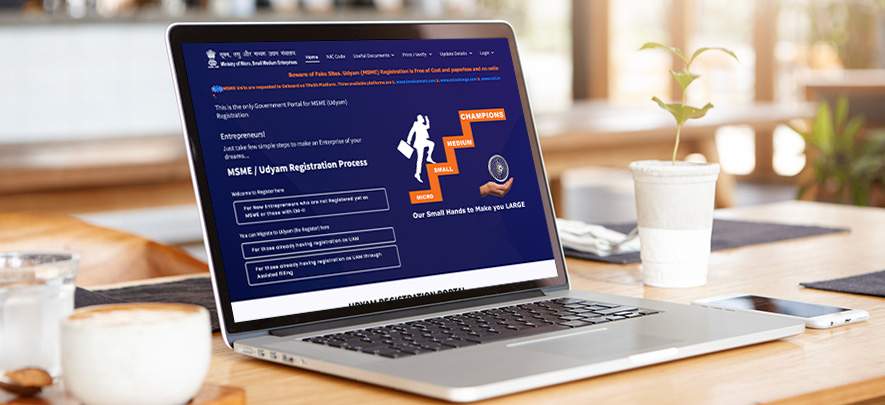Home » Msme registration in india
MSME Registration in India: Complete Guide

Starting and growing a business in India can be challenging — especially for small and medium enterprises that struggle with funding, market competition, and compliance. Thankfully, the Government of India has introduced several initiatives to support them, one of the most crucial being MSME registration in India.
MSME registration in India helps small and medium enterprises access benefits like low-interest loans, tax subsidies, ease of doing business, and government tender preferences.
Whether you are a budding entrepreneur or an established small business owner, getting registered under MSME (now known as Udyam) can be a game-changer for your business growth.
In this comprehensive guide, we’ll walk you through everything you need to know — from eligibility and process to documentation, advantages, and expert tips.
What Is MSME Registration in India?
MSME stands for Micro, Small, and Medium Enterprises, as defined under the Micro, Small, and Medium Enterprises Development (MSMED) Act, 2006.
MSME registration (currently known as Udyam Registration) is a government-issued recognition that helps businesses avail themselves of various financial and operational benefits.
After registration, your enterprise receives a unique Udyam Registration Number (URN) and a certificate issued by the Ministry of Micro, Small and Medium Enterprises.
Key Purpose of MSME Registration
To promote entrepreneurship and job creation
To simplify access to finance and subsidies
To encourage innovation and technology adoption
To formalize the small business sector for better policy implementation
MSME Classification Criteria (Updated 2024)
As per the latest government notification, MSMEs in India are classified based on investment in plant & machinery or equipment and annual turnover.
| Type of Enterprise | Investment Limit | Annual Turnover Limit |
|---|---|---|
| Micro Enterprise | Up to ₹1 crore | Up to ₹5 crore |
| Small Enterprise | Up to ₹10 crore | Up to ₹50 crore |
| Medium Enterprise | Up to ₹50 crore | Up to ₹250 crore |
This classification applies uniformly to manufacturing and service sectors, removing the earlier distinction between the two.
Benefits of MSME Registration in India
Getting your business registered as an MSME offers numerous financial, legal, and strategic benefits. Here are the key advantages:
1. Easier Access to Loans
Registered MSMEs enjoy collateral-free loans under schemes like Credit Guarantee Fund Trust for Micro and Small Enterprises (CGTMSE).
2. Lower Interest Rates
Banks and NBFCs offer preferential interest rates to MSME borrowers, helping businesses save on capital costs.
3. Government Tenders and Subsidies
MSMEs get priority in public procurement and are eligible for subsidies on patent registration, ISO certification, and technology upgrades.
4. Tax Benefits
MSMEs can claim income tax exemptions and enjoy easier compliance under the GST regime.
5. Delayed Payment Protection
Under the MSME Act, large companies must pay MSMEs within 45 days of receiving goods or services, reducing cash flow issues.
6. Business Credit Score Improvement
MSME registration enhances credibility and creditworthiness when applying for bank loans or government tenders.
7. Support During Economic Distress
During events like COVID-19, MSMEs receive special financial packages and moratorium support from the government.
Who Can Apply for MSME Registration?
MSME registration is open to a wide range of businesses operating in India, including:
Proprietorship firms
Partnership firms
Limited Liability Partnerships (LLPs)
Private Limited Companies
One Person Companies (OPCs)
Cooperative societies
Self-help groups
Producer companies
As long as your business meets the investment and turnover limits, you are eligible to apply for MSME registration in India.
Documents Required for MSME Registration
The registration process is completely online and paperless through the Udyam Registration Portal. However, keep the following details ready:
Basic Documents:
Aadhaar Card of the applicant (proprietor/partner/director)
PAN Card of the business or individual
GSTIN (if applicable)
Business address proof (utility bill, rental agreement, etc.)
Bank account details (account number and IFSC code)
Additional Information Required:
Type of organization (proprietorship, partnership, etc.)
Total investment in machinery/equipment
Annual turnover
Number of employees
NIC Code (Nature of business activity)
Step-by-Step Process for MSME Registration in India
Follow these steps carefully to complete MSME registration in India via the official Udyam portal (https://udyamregistration.gov.in/):
Step 1: Visit the Udyam Portal
Go to the official website — udyamregistration.gov.in.
Step 2: Enter Aadhaar Number
Provide your Aadhaar number and validate it with OTP.
Step 3: Fill Business Details
Enter business name, type, PAN, location, and other details as required.
Step 4: Provide Investment & Turnover Details
Input details about your plant & machinery investment and annual turnover.
Step 5: Choose NIC Code
Select the correct National Industrial Classification (NIC) code to describe your business activity.
Step 6: Submit & Verify
Once submitted, your information is verified using PAN and GST databases.
Step 7: Receive Udyam Certificate
After successful registration, you will receive an MSME Certificate with a unique Udyam Registration Number (URN).
Fees and Validity of MSME Registration
The registration process is free of cost — there are no government fees for MSME registration in India.
Once registered, the MSME certificate remains valid for a lifetime and does not require renewal. However, any changes in business structure or turnover should be updated on the portal.
Real-Life Example: How MSME Registration Helped a Startup Grow
Example:
A small Hyderabad-based furniture manufacturing company, CraftWood India Pvt. Ltd., applied for MSME registration in 2022. Within six months:
The company secured a low-interest working capital loan from SBI.
It received priority in tender allotment for local government contracts.
The firm availed subsidies for ISO certification and technology upgrades.
Today, CraftWood India has expanded its business across five states, proving how MSME registration can directly boost growth and credibility.
Common Mistakes to Avoid During MSME Registration
Many applicants face rejections due to small errors. Avoid these common mistakes:
Incorrect business details – Ensure your PAN and Aadhaar match the business type.
Wrong NIC code – Selecting the wrong industry classification can cause verification delays.
Multiple registrations – Each business should have only one Udyam registration.
Failure to update turnover data – Update yearly financial details to maintain compliance.
Using unofficial websites – Always register through the official Udyam portal to avoid fraud.
Expert Tips for Successful MSME Registration
✅ Use your official business email and mobile number for OTPs and communication.
✅ Keep all documents handy before starting the registration process.
✅ If your business has multiple branches, mention the main office as the principal location.
✅ Always cross-verify PAN and GST details before submission.
✅ For professional help, consult a business registration expert like Invention Tax Solutions to ensure error-free registration.
MSME Schemes and Support Programs (2024–2025)
After registration, MSMEs can access numerous government schemes for funding, training, and development:
Prime Minister’s Employment Generation Programme (PMEGP)
Credit Linked Capital Subsidy Scheme (CLCSS)
Technology and Quality Upgradation Support (TEQUP)
Zero Defect Zero Effect (ZED) Certification Scheme
MSME Samadhan for delayed payment disputes
Pros and Cons of MSME Registration
| Pros | Cons |
|---|---|
| Easy access to finance | Annual turnover reporting required |
| Government subsidies | Limited to small & medium businesses |
| Tax and tender benefits | Must maintain accurate records |
| Recognition and credibility | Misreporting can lead to penalties |
Internal Linking Suggestions
Business Registration in India – for readers exploring other business formation types.
GST Registration in India – to understand tax compliance after MSME registration.
ISO Certification Services – for MSMEs seeking quality and credibility improvement.
5 FAQs on MSME Registration in India
1. Is MSME registration mandatory?
No, it’s not mandatory, but it is highly beneficial for availing government benefits and loans.
2. Can traders apply for MSME registration?
Yes, as per the latest update, both manufacturers and service providers, including traders, are eligible.
3. Is GST registration required for MSME registration?
Not necessarily. However, it’s recommended if your turnover exceeds the GST threshold.
4. Can a company have multiple MSME registrations?
No. One business entity can have only one Udyam registration.
5. How long does MSME registration take?
The entire process takes 5–10 minutes if all details are correct. The certificate is issued instantly online.
Conclusion: Empower Your Business with MSME Registration in India
In conclusion, MSME registration in India is one of the simplest yet most powerful steps small and medium businesses can take to unlock financial benefits, government incentives, and growth opportunities.
It enhances your business credibility, access to finance, and competitive advantage in both domestic and international markets.
If you’re planning to register your MSME, don’t wait. Get expert assistance from Invention Tax Solutions, one of India’s leading business registration consultants, to ensure a seamless and professional experience.
📞 Ready to Register Your MSME?
Contact Invention Tax Solutions today to get your MSME registration in India done quickly and accurately — without the hassle.


